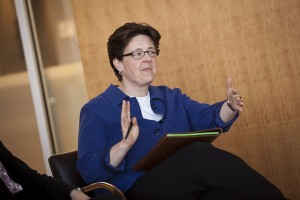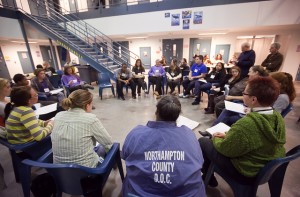
Mary Armstrong, associate professor and chair of women’s and gender studies, moderates a discussion of artists’ books during Women’s History Month.
When Jiselle Peralta ’13 (Rego Park, N.Y.) took a course called Literary Women, her goal was to simply fulfill an English requirement. But that course turned into an eye-opening experience that inspired her to take more courses in the women’s and gender studies (WGS) program. Peralta was working on a minor in WGS when a new major became available last spring.
Now a double major in psychology and WGS, Peralta says she appreciates the small sizes of the classes in the WGS program, and the atmosphere the faculty cultivate.
“The professors create a safe environment in which the students are able to express their opinions openly and without judgment,” she says.
Women’s and gender studies empowers students to understand the role of gender in women’s and men’s lives, and in society as a whole. The new degree highlights Lafayette’s growing commitment to an interdisciplinary approach to learning, as well as the inclusiveness of the college’s curriculum. The program has a strong core of WGS courses, including several community-based service-learning courses. With links to more than a dozen other departments and programs, the WGS program involves about 40 Lafayette faculty.
“The women’s and gender studies major prepares students to become confident leaders within today’s diverse society and evolving global workplace,” says program chair Mary Armstrong, associate professor of women’s and gender studies/English. “WGS majors acquire the ability to understand how gender affects every level of human experience: cultural, technological, psychological, scientific, political, economic, and aesthetic. WGS courses teach students to combine and synthesize different kinds of knowledge into a set of sophisticated problem-solving skills.”

Lafayette students and inmates from Northampton County Prison meet weekly during the Women and the U.S. Criminal Justice System course taught by Bonnie Winfield, director of the Landis Community Outreach Center.
WGS majors work closely with their adviser to select a sequence of courses that brings focus to their studies and is suited to their particular interests. Students majoring in WGS are strongly encouraged to participate in a WGS internship or community-based learning course and to study abroad, when possible.
There are numerous potential career paths for a student who earns a degree in WGS. Majors might go on to work in advocacy, counseling, education, law, psychology, public health, and public policy. Many WGS majors choose to double major, combining their WGS coursework with another Lafayette degree.
After she graduates from Lafayette, Peralta is considering applying for Teach for America. “I hope to bring with me all of the lessons and values I learned through my major into the workplace and classroom, in which every person I encounter is treated equally and with respect despite their gender or sexual orientation,” she says.
The WGS program emphasizes service learning as a way for students to learn with and from members of the local community.
For example, the Women and the U.S. Criminal Justice System course taught by Bonnie Winfield, director of the Landis Community Outreach Center, holds its weekly class meetings at Northampton County Prison. Half the students are from Lafayette, and the other half are women serving sentences for non-violent crimes. These two groups of students complete the same readings and assignments. The discussions that ensue not only give a more sophisticated understanding of the role that race, class, and gender play in the U.S. criminal justice system, but also destroy false and demeaning stereotypes and create bonds of mutual respect among women who tend to come from very different backgrounds.
In another service learning course, led by Deborah Byrd, associate professor of English, students learn about single motherhood through interactions with pregnant and parenting teens at Easton Area High School and with single mothers residing at shelters for homeless families.
“As they learn about the challenges faced by these single mothers, Lafayette students are inspired to find ways to support women they come to regard as both knowledgeable and inspirational,” Byrd says.
The interdisciplinary nature of WGS is its key asset.
“Core WGS courses, and the WGS major experience, require that students learn to use knowledge across multiple conceptual and analytical frameworks. The difficult issues that we encounter—inside the WGS classroom and in the world off-campus—require complex approaches and solutions. In WGS, students gain the ability to think and work across disciplinary boundaries and learn how to use different perspectives to fully analyze and address complex social problems,” Armstrong says.
Core courses are offered in topics such as women’s health issues, African and African-American women, gender and science, women in film and women filmmakers, and black feminism. Two new courses offered this fall are Feminist Theory and Sexuality Studies.
The new Women’s and Gender Studies Library and Resource Room in Pardee Hall is available to WGS students and faculty on weekdays between 10 a.m and 4 p.m. Faculty use this space for meetings with small groups of students, getting together with project groups, checking in with students who are on internships, and running independent studies or interviews.


1 Comment
I think this is a grate thing. I also think Lafayette should have a criminal justice program.
Comments are closed.